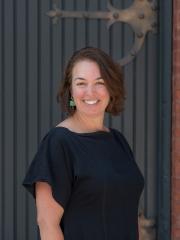Tuesday, June 1, 2021
For Immediate Release
Jen Cirillo Helps Educators Make Connections
Between Food Science and Sustainability
Quincy, MA & Shelburne, VT – As Jen Cirillo, Director of Professional Learning at Shelburne Farms, studies agriculture, she makes connections between science and education for a sustainable future. She designs professional learning that supports place-based and sustainability-focused educational approaches and integrates information about food systems at the local, regional, national and global levels. “I feel a strong affinity towards teachers and the teaching profession, and I’m constantly wondering what more I can do to support them,” says Jen. After working with the Wade Institute for Science Education in a variety of ways over the years, she is enthusiastic about partnering for the 2021 Summer Professional Development Institute, How Does Your Dinner Grow? Exploring Connections Between Food Production and Sustainability.

Photo courtesy of Jen Cirillo, Shelburne Farms
During the institute, Jen will focus on Big Ideas of Sustainability (core concepts from our daily lives that align with the STEM curriculum) such as systems, cycles, equity, and diversity and how educators can engage students in food and agricultural themes within their school system.
She is excited that educators will gain skills using up-to-date pedagogy with the Wade Institute, background knowledge about food systems and sustainability from Shelburne Farms, and ideas for student-led initiatives for sustainable resource management from Massachusetts Farm to School. Jen says that a focus of the institute will be on “bringing continued attention to the food system. It’s so interconnected with our ecosystem, health care system, climate change, and education. Once educators see how much can be done connected to food, it really gets the whole community excited.”
Jen is looking forward to learning from educators about their successes in bringing the institute content and inquiry-based investigations back to their classrooms. She notes that Shelburne Farms shares the Wade Institute’s culture of collaboration and constructive feedback, and she recognizes how evaluation of programming is an important part of the learning process for educators. As an example, she talks about how a school participating in the 2020 Northeast Farm to School Institute shifted their project focus from internal school food systems to development of a community food access program (solidarity fridges) in light of lessons learned about the impacts of the pandemic on families. By partnering with the Wade Institute for Science Education and Massachusetts Farm to School for our 2021 Summer Professional Development Institute, How Does Your Dinner Grow? Connections Between Food Production and Sustainability, Jen seeks to inspire more educators to incorporate current science of food systems and sustainability into their inquiry-based lessons to further promote equity in schools.
For more information about our collaborative institute, visit www.wadeinstitutema.org/spdi-k12.
###
The Wade Institute for Science Education specializes in providing inquiry-based, hands-on, minds-on, science, technology and engineering professional development for K-12 teachers and informal educators. For more information, visit www.wadeinstitutema.org or call 617-328-1515.
